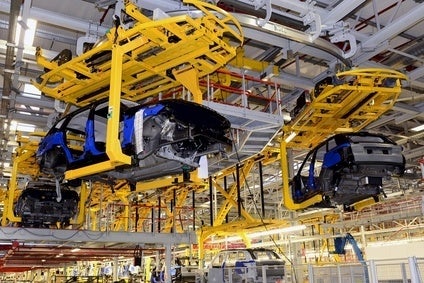
Annual car production in the UK is forecast to hit a new record of two million units by 2020 according to a new report published by the SMMT.
The projected growth to annual car output of 2m units would exceed the existing record of 1.92m units hit in 1972.

Discover B2B Marketing That Performs
Combine business intelligence and editorial excellence to reach engaged professionals across 36 leading media platforms.
The SMMT report also suggests that the higher output will benefit UK parts suppliers as more jobs are created in the supply chain. The report forecasts that up to 9,500 jobs will be created at source by vehicle manufacturers and that there could be a further 28,000 jobs created at component supply companies as UK manufacturers’ demand for home-grown components increases.
More than 1.5m cars were built in the UK in 2014. UK vehicle production is also heavily export-focused, with over 78% of production exported in 2014, a significant proportion of which went to Europe.
The SMMT report – The Future of UK Automotive Manufacturing in 2025 and Beyond – provides a comprehensive long-term outlook on the future of the UK automotive industry.
The report also highlights a switch in UK car production away from basic, entry or some mid-market cars and towards higher-value premium vehicles. This trend is driven by the UK’s cost base, as labour costs mean that the production of small cars is unprofitable. In response, UK vehicle companies have progressively focused on manufacturing higher value, or premium vehicles: in 2010, 37% of UK car production consisted of premium brands, since when this ratio has risen – and should reach 54% by 2020, the report says.
This reflects the success of recent model launches by Jaguar Land Rover and its overall range extension, the continued popularity of BMW's MINI, and the addition to the Nissan factory of the Infiniti Q30. In contrast, production by mass-market brands, even when it has risen, has grown more slowly than at the premium brands, the report maintains. The UK is already Europe’s second-highest producer of premium cars, behind only Germany, the report points out.
Speaking at the launch of the report in London, Mike Hawes, SMMT Chief Executive, said: “This report is further proof of the growing stature of the UK as a global destination for high quality vehicle manufacture. The automotive industry has made tremendous strides in recent years, as significant investment, along with partnership with government, has driven huge growth in production and employment.”
Report author Ian Henry emphasised the importance, from an automotive business perspective, of the UK remaining inside the European Union. “The projections in this report – and indeed those used by many analysts and observers in the industry – assume that economic conditions remain largely as they are now, or hopefully improve, and that the UK remains within the EU,” he said. “The level of trade with Europe is so high, that the uncertainties that would follow a no vote in the national referendum would create serious concern in the automotive business.
“Broader political events, especially the refugee crisis and events in the Middle East, may shift the EU debate away from the economic case for membership towards social and political issues. This could well change public opinion, irrespective of the economic arguments favouring continued membership.
“The full implications for the automotive industry and further investment in the UK in the event of the UK leaving the EU have yet to be worked out, although reduced long-term commitment by European, Japanese, and US vehicle and component companies to the UK cannot be discounted.”
While the report points to positive job creation potential in the UK supply chain as vehicle output rises, Henry points out that there is a considerable training challenge ahead to ensure that the labour force has the right skills to underpin future business success. “Higher levels of automation in manufacturing and the constant pressure for higher productivity mean that it is essential that we are training our young people – especially in engineering apprenticeships – for the demands of manufacturing facilities in 10-15 years' time and not simply for the world of work today,” he said.
“It's still a little unclear how the UK government’s plans for three million apprentices by 2020 will reflect the automotive industry’s need for a new set of skills in its future workforce. At this stage, an industry-wide consensus on what should be done in this area has not emerged and this should be addressed as a matter of urgency.”
Importance of AIO for the supplier sector
The report also says that the automotive industry and government are engaged in a number of programmes to support the growth of the sector in general and the UK’s supply chain in particular. At the centre of this is the Automotive Council and the work streams that operate under its umbrella. In parallel, government and industry have funded the start-up of a number of important initiatives, such as the Advanced Propulsion Centre (APC) and other technology catapults: bodies which are intended to help the UK develop and sustain a leadership position in key future technologies.
Integral to the rebuilding of the supply chain and boosting UK component exports is the Automotive Investment Organisation (AIO), part of BIS, established in 2013. This has already secured 14,000 jobs in the UK during its second year of operation, against an initial three-year target of 15,000.






